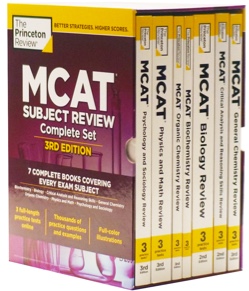
Test takers also like that what they see on the screen when they take a Blueprint practice test is very similar to the screen of the MCAT. Many people’s scores on Blueprint tests are within five to seven points of what they ultimately score on the MCAT. Particularly, they find the Chemical and Physical Foundations of Biological Systems Section (CP) and the Biological and Biochemical Foundations of Living Systems (BB) very representative of the real test.

Notably, many test takers say that Blueprint is the closest thing to the real MCAT after the AAMC practice tests.
#Princeton review mcat practice test full#
Previously known as NextStep, Blueprint full length practice tests are also harder than the real MCAT, although not as hard as some of the other practice tests. Many people report that these exams in particular are what gave them a wakeup call and kicked their studying into high gear. Even though this is different from how the MCAT asks questions, a lot of test takers said that this gave them a good idea of where their content knowledge was weak. These tests include many questions that ask you to recall specific details and facts at a higher rate than the questions on the MCAT. This might even be one of the most difficult tests, with many people reporting their scores on TPR practice tests were 10 to 15 points lower than their score on the real thing. Many test takers found that the Critical Analysis and Reasoning section (CARS) was very different compared to what they saw on the MCAT. Like other practice tests, The Princeton Review (TPR) practice tests are often reported as being harder than the real MCAT. Kaplan practice tests tend to focus more on content knowledge and minutiae, while MCAT has a stronger focus on assessing how you think, not just what you know. Test takers often report a discrepancy between the types of questions asked on the Kaplan practice tests vs. Due to the difficulty, many people report that they like Kaplan tests so they can see where their knowledge gaps are, but don’t like them so much as a score predictor. Some people report that the Kaplan tests were so difficult that they started overthinking, which threw them off and caused them to lose some confidence in their abilities. Most test takers report that Kaplan practice tests are more difficult, with many scoring about ten points higher on the real MCAT than they did on Kaplan practice tests. If you want something as close as possible to the real MCAT, you’re going to have to pay for one (or more) of their full-length practice exams that provide scaled scoring.
#Princeton review mcat practice test free#
People also note that AAMC’s free practice test that does not provide you with a scaled score is easier than the real MCAT. This is also why almost every test taker utilizes AAMC’s practice materials. Many students report that their actual MCAT score is very similar to what they scored on AAMC practice tests. In theory, the AAMC practice tests should be as close as possible to the real MCAT because these tests are written by the same test developers who write the MCAT. Knowing how much scores on any given practice test tend to compare to MCAT scores can also help give you a better idea of how your preparation is coming along.Īll of the practice tests we examine below are as close as possible to the real MCAT in terms of structure, but of course, no practice test is going to be exactly the same as the MCAT in terms of content.

Nonetheless, having a general idea of how the tests compare can help you choose ones that are best for you.



 0 kommentar(er)
0 kommentar(er)
